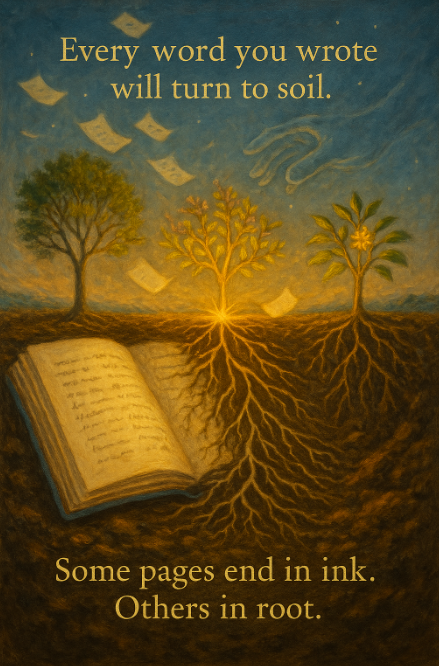
August 12, 2026 — Crestview, under a bruised summer sky
The orchard back home had grown wild in their absence.
Tiny blossoms clung to branches as if afraid to fall. Emil stood beneath one of them, the soft hum of insects mixing with the ache of memory. His hands still smelled faintly of paint and dust, though he hadn’t touched a brush since Kashmir.
Grandfather found him there—hat in hand, gait slow but certain.
He had read the news, seen the quiet ripple of articles, the photo of the veiled murals. Yet he asked nothing. He simply sat beside Emil on the stone bench, their silence layered with the weight of what both already knew.
“The papers said the valley healed,” Grandfather murmured.
Emil shook his head. “It breathed. That’s all we managed.”
“That’s more than most wars ever allow,” Grandfather said.
For a while, they watched a sparrow drink from the birdbath.
The water rippled—small, perfect circles spreading outward, fading before they reached the edge.
The Ledger’s Rest
“The ledger’s different now,” Emil said finally. “It doesn’t feel like a record anymore. It feels… alive. Like it keeps breathing when I’m not writing.”
Grandfather smiled faintly. “Good. That means you’ve stopped trying to own memory. It now owns you just enough to teach.”
Emil turned the gray stone over in his hand—the one he had carried since the Jhelum. Its edges had smoothed with time, like words repeated too often.
“I can still hear the mothers,” he said. “When I close my eyes, their brushes move. Their silence speaks louder than our entire mission.”
“That’s because silence,” Grandfather said, “is not the absence of sound. It’s the presence of everything we can’t yet say.”
He reached into his pocket and pulled out a small paper bag filled with dry compost and soil from the greenhouse.
“Come,” he said. “Let’s give that silence something to grow in.”
Together, they walked into the greenhouse. The air was thick with moisture and old sunlight.
Grandfather opened the ledger to a blank page, tore it carefully down the center, and buried the strips under a young sapling.
“The ledger will feed the roots now,” he said. “Every word you wrote will turn to soil. Some pages end in ink. Others in root.”
Emil watched the soil settle. “And what if the roots forget the words?”
Grandfather smiled, eyes glinting.
“Then they’ve learned the only lesson that matters: healing doesn’t need remembering to endure.”
The Unfinished Door
That evening, as light thinned into amber, Emil lingered in the greenhouse doorway.
The sapling leaned toward him, its small leaves trembling in the fan’s breeze.
He whispered, half to himself:
“I opened a door. I didn’t close it.”
Grandfather, from the porch, replied softly,
“Doors are meant to stay open, Emil. So others may find their way through.”
The first night insects began to sing.
And in the quiet between their songs, the sound of a distant river seemed to rise—not the Jhelum anymore, but something wider, slower, older.
The Nile was calling.

